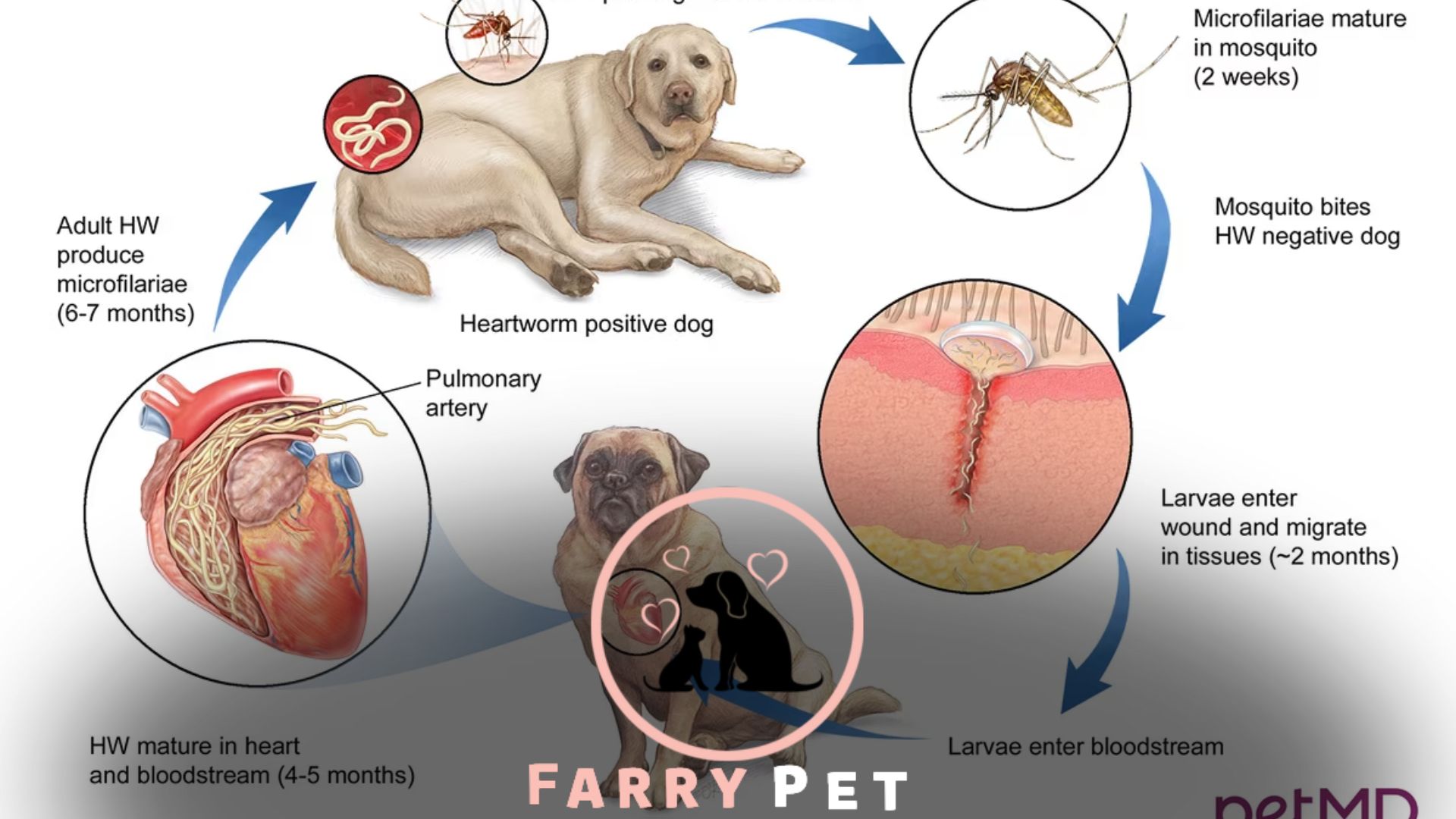
Heartworms can cause coughing in dogs as the larvae migrate to the lungs and cause inflammation. Heartworm disease is a serious condition that can lead to severe respiratory symptoms and even death if left untreated.
It is important for dog owners to be aware of heartworm disease symptoms and seek veterinary care promptly if their dog is coughing or displaying other signs of illness.
Early detection and treatment can significantly increase the chances of a successful outcome for dogs with heartworm disease, so regular preventive measures, such as administering heartworm medication, are crucial for maintaining a dog’s overall health and well-being.
Do Heartworms Make a Dog Cough?
Understanding the Relationship
Heartworms can be transmitted to dogs through mosquito bites. Once infected, the heartworm larvae grow into adult worms that primarily inhabit the heart and lungs of the dog.
As heartworms reproduce and multiply, they can impede the blood flow and damage the organs.
If left untreated, dogs with heartworms may experience severe health issues and can even face death. One common symptom of heartworm infection is coughing.
The cough occurs because the heartworms can obstruct the pulmonary arteries and cause lung inflammation.
This irritation triggers the dog to cough, particularly during physical activity or when lying down. Hence, if you notice your dog coughing, it is essential to consult with a veterinarian for proper diagnosis and treatment to prevent any further complications.
Understanding the relationship between heartworms and coughing in dogs is crucial for their well-being. Taking your furry friend on a car ride is often enjoyable, but have you ever wondered; do car rides make dogs sleepy?
Identifying Symptoms of Heartworm Infection
Heartworm infection in dogs can cause coughing, but it is not always the primary symptom. It’s essential to be aware of other signs of heartworm disease in dogs.
These may include fatigue, weight loss, decreased appetite, and a reluctance to exercise.
Some dogs may also experience difficulty breathing or even fainting. Regular check-ups with a veterinarian and routine heartworm testing can help catch any infection early on.
Prevention is key, so administer heartworm preventatives as recommended by your vet.
If you suspect your dog may be infected, it’s crucial to seek veterinary care immediately. Early detection and treatment are essential for managing heartworm disease and improving your dog’s chances of a full recovery.
Stay vigilant and keep your furry friend safe from this potentially life-threatening condition. Understanding the potential hazards of household items like Orbeez is crucial to safeguarding your dog’s health. Find out: are Orbeez toxic to dogs?

The Mechanism Behind Heartworm-Induced Coughing
Heartworms can indeed cause coughing in dogs by affecting their respiratory system. These parasitic worms invade the heart chambers and pulmonary arteries, leading to inflammation and damage.
As the heartworm larvae grow and multiply, they obstruct blood flow and compromise lung function.
This triggers the cough reflex as the body tries to expel irritants. The connection between heartworm larvae and coughing lies in the inflammation they cause within the lungs.
Consequently, dogs infected with heartworms may experience persistent coughing as a symptom.
It is crucial to detect and treat heartworm infections promptly to prevent further complications and ensure the well-being of our furry friends.
Regular veterinary check-ups and preventive measures are essential in safeguarding our dogs from this potentially harmful condition.
Diagnosis and Treatment of Heartworm-Induced Cough
Heartworms can indeed cause dogs to cough. Diagnosis and treatment of heartworm-induced cough require specific tests. Diagnostic tests help identify heartworm infection, while treatment addresses the underlying infestation.
Treating heartworm in dogs is crucial to prevent further complications. Alongside addressing the infection, managing the cough associated with heartworm disease is also necessary.
These steps help mitigate discomfort and improve the dog’s quality of life. By diagnosing, treating, and managing heartworm-induced cough, dog owners can ensure their pet’s well-being and reduce the risk of complications.
Regular check-ups and preventive measures are essential in safeguarding dogs against heartworm infections and associated symptoms like coughing.
Understanding the diagnosis and treatment options allows for early intervention and better outcomes. Exposing pets to smoke is concerning, but can blowing smoke in a dog’s face really kill them?
Preventing Heartworm Infection and Cough
Heartworms can cause dogs to cough, but preventing heartworm infection is crucial. Effective prevention methods can minimize the risk of heartworm-induced cough in dogs.
It is essential to protect your furry friend from this dangerous parasite, as heartworm infection can lead to severe health issues.
Regularly administering heartworm medications as prescribed by your veterinarian is essential. These medications kill the larvae before they can develop into adult heartworms.
In addition to medications, avoiding areas with a high mosquito population and keeping your dog indoors during peak mosquito hours can help reduce the risk of infection.
Remember, prevention is always better than treatment regarding heartworms and cough prevention in dogs. Keep your canine companion healthy and happy by taking the necessary steps to prevent heartworm infection.
Conclusion: Do Heartworms Make a Dog Cough!!
Understanding the relationship between heartworms and a dog’s cough is crucial for pet owners. A persistent cough can be a potential symptom of heartworm disease, as the parasites reside in the lungs and heart of infected dogs.
Early detection and regular preventive measures, such as monthly heartworm medications, are essential in safeguarding our furry friends from this dangerous condition.
Additionally, a veterinarian should be consulted at the first sign of a cough or any other problematic symptoms to determine the underlying cause and appropriate treatment.
It is important to remember that heartworms can be life-threatening if left untreated, and prevention is the key to keeping our canine companions healthy and happy.
By prioritizing their well-being and staying vigilant, we can protect our beloved pets from the risks associated with heartworms and associated coughs.
Trust your veterinarian’s guidance, be proactive, and keep your furry friend safe from heartworm disease.





![Do Car Rides Make Dogs Sleepy? [Discover Why?]](https://farrypet.com/wp-content/uploads/2023/08/Do-Car-Rides-Make-Dogs-Sleepy-768x432.jpg)
